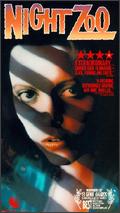Night Zoo (French: Un Zoo la nuit) is a 1987 Canadian film. It is directed and written by Jean-Claude Lauzon. It made its debut at the 1987 Cannes Film Festival. The film was selected as the Canadian entry for the Best Foreign Language Film at the 60th Academy Awards, but was not accepted as a nominee.[1]
| Night Zoo | |
|---|---|
 Film poster | |
| French | Un Zoo la nuit |
| Directed by | Jean-Claude Lauzon |
| Written by | Jean-Claude Lauzon |
| Produced by | Roger Frappier Pierre Gendron |
| Starring | Gilles Maheu Lynne Adams Roger Lebel |
| Cinematography | Guy Dufaux |
| Edited by | Michel Arcand |
| Music by | Jean Corriveau |
| Distributed by | FilmDallas (US theatrical) |
Release date |
|
Running time | 115 minutes |
| Country | Canada |
| Language | French |
| Box office | 1.3 million CAD |
It was also the most successful film in the history of the Academy of Canadian Cinema and Television's film awards program, winning a record 13 Genie Awards in every single category where it was nominated.[2] The film garnered 14 nominations overall;[3] the film's only nomination that failed to translate into a win was Gilles Maheu's nod for Best Actor, as he lost to the film's other Best Actor nominee, Roger Lebel.
Plot
editMarcel (Gilles Maheu) is released from prison, hoping to reconcile with his dying father, Albert (Lebel). Marcel is also harassed by a corrupt gay cop. Marcel returns to his father who reveals that he has money and drugs stashed away for him. Marcel and his gay former cellmate both corner the corrupt cop and get their revenge on him. Julie (Adams) is Marcel's former girlfriend who works in a sex club peep show.
Reception
editBox office
editThe film grossed $1 million in Quebec within three months of its release.[4]
Awards
editThe film won the most Genie Awards in history, with thirteen awards.[4] Gilles Maheu and Roger Lebel were both nominated for best actor.[5][6]
In 1987, the film won the Grand Prix for Best Film at Film Fest Gent.
Accolades
edit| Award | Date of ceremony | Category | Recipient(s) | Result | Ref. |
|---|---|---|---|---|---|
| Genie Awards | 22 March 1988 | Best Picture | Roger Frappier, Pierre Gendron | Won | [5] |
| Best Director | Jean-Claude Lauzon | Won | |||
| Best Screenplay | Jean-Claude Lauzon | Won | |||
| Best Actor | Roger Lebel | Won | |||
| Gilles Maheu | Nominated | [6] | |||
| Best Supporting Actor | Germain Houde | Won | [5] | ||
| Best Art Direction or Production Design | Jean-Baptiste Tard | Won | |||
| Best Cinematography | Guy Dufaux | Won | |||
| Best Costume Design | Andrée Morin | Won | |||
| Best Editing | Michel Arcand | Won | |||
| Best Overall Sound | Adrian Croll Hans Peter Strobl Yvon Benoît |
Won | |||
| Best Sound Editing | Viateur Paiement Marcel Pothier Diane Boucher |
Won | |||
| Best Music Score | Jean Corriveau | Won | |||
| Best Original Song | Jean-Pierre Bonin Daniel De Shaimes Jean Corriveau Robert Stanley |
Won |
Availability
editThe film was released on videocassette in the United States in 1988 by New World and in Canada that same year by Cinema Plus Video. In 1991, an EP-Mode tape of the film was released by Starmaker Video. After Lauzon was killed in the northern Quebec plane crash in 1997, CBC Television, Télé-Québec and Showcase aired Night Zoo and Léolo in August.[7] To this day, Night Zoo has never been released on DVD and as of June 28, 2011, no plans have been made to release the film onto DVD. It was digitized and restored in May 2013 by Éléphant and is available for online rental on the iTunes Store.
See also
editReferences
edit- ^ Margaret Herrick Library, Academy of Motion Picture Arts and Sciences
- ^ "It was Un Zoo's night; Quebec film wins record 13 Genies". Montreal Gazette, March 23, 1988.
- ^ "Night Zoo thriller sets Genie record; Lauzon film wins 14 nominations". Ottawa Citizen, February 17, 1988.
- ^ a b Melnyk 2004, p. 201-202.
- ^ a b c "All The Genie Winners". Vancouver Sun. 23 March 1988. p. F5. Archived from the original on 19 December 2023 – via Newspapers.com.
- ^ a b "Quebec's brutal Night Zoo thriller wins 13 awards but glory fades 'if all Canada can't see our films'". Times Colonist. 23 March 1988. p. B11. Archived from the original on 19 December 2023 – via Newspapers.com.
- ^ Playback Staff, "Industry mourns Lauzon, Tougas," Playback, 25 August 1997, URL accessed 26 August 2016.
Works cited
editExternal links
edit- Night Zoo at IMDb
- Un Zoo la Nuit at AllMovie